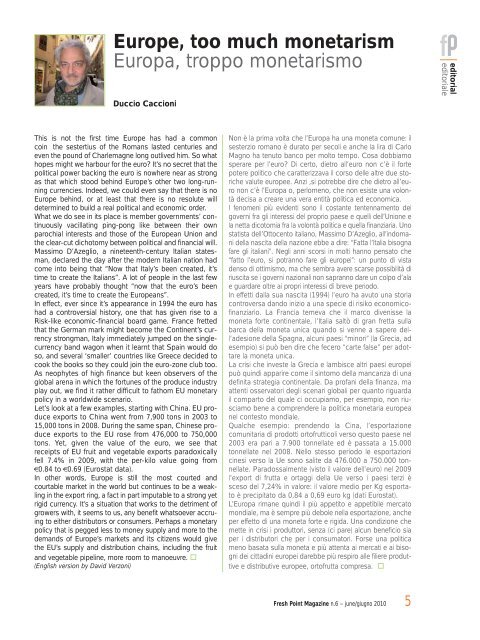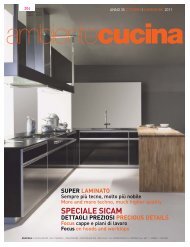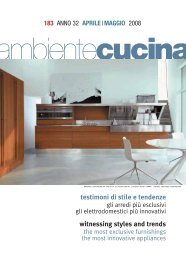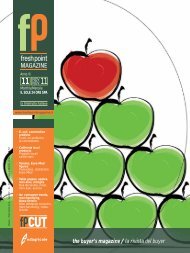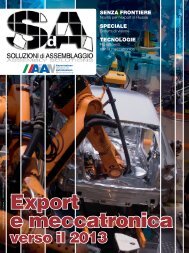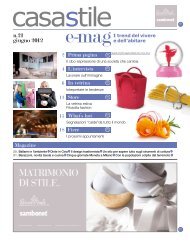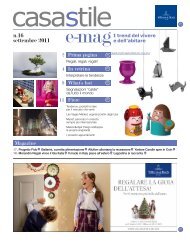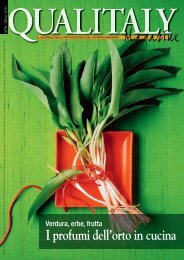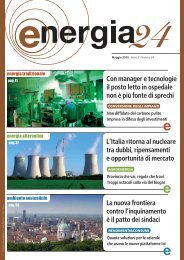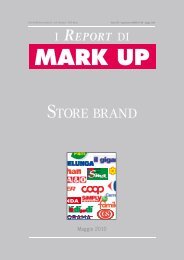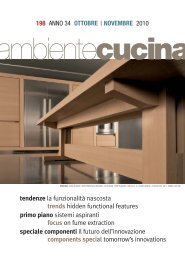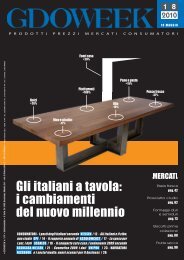Fresh Point Magazine - B2B24 - Il Sole 24 Ore
Fresh Point Magazine - B2B24 - Il Sole 24 Ore
Fresh Point Magazine - B2B24 - Il Sole 24 Ore
Create successful ePaper yourself
Turn your PDF publications into a flip-book with our unique Google optimized e-Paper software.
Europe, too much monetarism<br />
Europa, troppo monetarismo<br />
Duccio Caccioni<br />
This is not the first time Europe has had a common<br />
coin the sestertius of the Romans lasted centuries and<br />
even the pound of Charlemagne long outlived him. So what<br />
hopes might we harbour for the euro? It’s no secret that the<br />
political power backing the euro is nowhere near as strong<br />
as that which stood behind Europe’s other two long-running<br />
currencies. Indeed, we could even say that there is no<br />
Europe behind, or at least that there is no resolute will<br />
determined to build a real political and economic order.<br />
What we do see in its place is member governments’ continuously<br />
vacillating ping-pong like between their own<br />
parochial interests and those of the European Union and<br />
the clear-cut dichotomy between political and financial will.<br />
Massimo D’Azeglio, a nineteenth-century Italian statesman,<br />
declared the day after the modern Italian nation had<br />
come into being that “Now that Italy’s been created, it’s<br />
time to create the Italians”. A lot of people in the last few<br />
years have probably thought “now that the euro’s been<br />
created, it’s time to create the Europeans”.<br />
In effect, ever since it’s appearance in 1994 the euro has<br />
had a controversial history, one that has given rise to a<br />
Risk-like economic-financial board game. France fretted<br />
that the German mark might become the Continent’s currency<br />
strongman, Italy immediately jumped on the singlecurrency<br />
band wagon when it learnt that Spain would do<br />
so, and several ‘smaller’ countries like Greece decided to<br />
cook the books so they could join the euro-zone club too.<br />
As neophytes of high finance but keen observers of the<br />
global arena in which the fortunes of the produce industry<br />
play out, we find it rather difficult to fathom EU monetary<br />
policy in a worldwide scenario.<br />
Let’s look at a few examples, starting with China. EU produce<br />
exports to China went from 7,900 tons in 2003 to<br />
15,000 tons in 2008. During the same span, Chinese produce<br />
exports to the EU rose from 476,000 to 750,000<br />
tons. Yet, given the value of the euro, we see that<br />
receipts of EU fruit and vegetable exports paradoxically<br />
fell 7.4% in 2009, with the per-kilo value going from<br />
€0.84 to €0.69 (Eurostat data).<br />
In other words, Europe is still the most courted and<br />
courtable market in the world but continues to be a weakling<br />
in the export ring, a fact in part imputable to a strong yet<br />
rigid currency. It’s a situation that works to the detriment of<br />
growers with, it seems to us, any benefit whatsoever accruing<br />
to either distributors or consumers. Perhaps a monetary<br />
policy that is pegged less to money supply and more to the<br />
demands of Europe’s markets and its citizens would give<br />
the EU’s supply and distribution chains, including the fruit<br />
and vegetable pipeline, more room to manoeuvre.<br />
(English version by David Verzoni)<br />
Non è la prima volta che l’Europa ha una moneta comune: il<br />
sesterzio romano è durato per secoli e anche la lira di Carlo<br />
Magno ha tenuto banco per molto tempo. Cosa dobbiamo<br />
sperare per l’euro? Di certo, dietro all’euro non c’è il forte<br />
potere politico che caratterizzava il corso delle altre due storiche<br />
valute europee. Anzi ,si potrebbe dire che dietro all’euro<br />
non c’è l’Europa o, perlomeno, che non esiste una volontà<br />
decisa a creare una vera entità politica ed economica.<br />
I fenomeni più evidenti sono il costante tentennamento dei<br />
governi fra gli interessi del proprio paese e quelli dell’Unione e<br />
la netta dicotomia fra la volontà politica e quella finanziaria. Uno<br />
statista dell’Ottocento italiano, Massimo D’Azeglio, all’indomani<br />
della nascita della nazione ebbe a dire: “Fatta l’Italia bisogna<br />
fare gli italiani”. Negli anni scorsi in molti hanno pensato che<br />
“fatto l’euro, si potranno fare gli europei”: un punto di vista<br />
denso di ottimismo, ma che sembra avere scarse possibilità di<br />
riuscita se i governi nazionali non sapranno dare un colpo d’ala<br />
e guardare oltre ai propri interessi di breve periodo.<br />
In effetti dalla sua nascita (1994) l’euro ha avuto una storia<br />
controversa dando inizio a una specie di risiko economicofinanziario.<br />
La Francia temeva che il marco divenisse la<br />
moneta forte continentale, l’Italia saltò di gran fretta sulla<br />
barca della moneta unica quando si venne a sapere dell’adesione<br />
della Spagna, alcuni paesi “minori” (la Grecia, ad<br />
esempio) si può ben dire che fecero “carte false” per adottare<br />
la moneta unica.<br />
La crisi che investe la Grecia e lambisce altri paesi europei<br />
può quindi apparire come il sintomo della mancanza di una<br />
definita strategia continentale. Da profani della finanza, ma<br />
attenti osservatori degli scenari globali per quanto riguarda<br />
il comparto del quale ci occupiamo, per esempio, non riusciamo<br />
bene a comprendere la politica monetaria europea<br />
nel contesto mondiale.<br />
Qualche esempio: prendendo la Cina, l’esportazione<br />
comunitaria di prodotti ortofrutticoli verso questo paese nel<br />
2003 era pari a 7.900 tonnellate ed è passata a 15.000<br />
tonnellate nel 2008. Nello stesso periodo le esportazioni<br />
cinesi verso la Ue sono salite da 476.000 a 750.000 tonnellate.<br />
Paradossalmente (visto il valore dell’euro) nel 2009<br />
l’export di frutta e ortaggi della Ue verso i paesi terzi è<br />
sceso del 7,<strong>24</strong>% in valore: il valore medio per Kg esportato<br />
è precipitato da 0,84 a 0,69 euro kg (dati Eurostat).<br />
L’Europa rimane quindi il più appetito e appetibile mercato<br />
mondiale, ma è sempre più debole nella esportazione, anche<br />
per effetto di una moneta forte e rigida. Una condizione che<br />
mette in crisi i produttori, senza (ci pare) alcun beneficio sia<br />
per i distributori che per i consumatori. Forse una politica<br />
meno basata sulla moneta e più attenta ai mercati e ai bisogni<br />
dei cittadini europei darebbe più respiro alle filiere produttive<br />
e distributive europee, ortofrutta compresa.<br />
<strong>Fresh</strong> <strong>Point</strong> <strong>Magazine</strong> n.6 – june/giugno 2010<br />
5<br />
editorial<br />
editoriale


